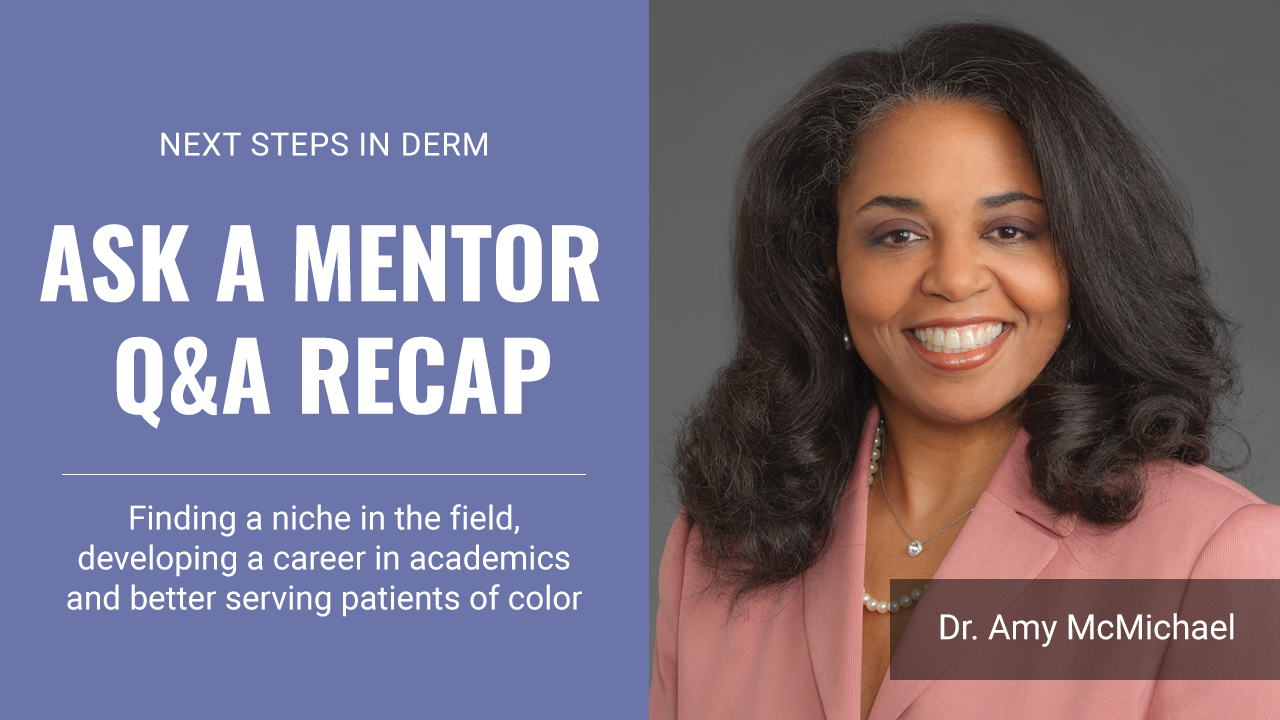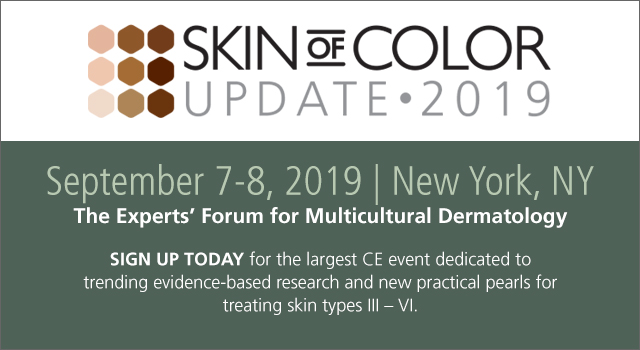Our Next Steps readers had the opportunity to ask a mentor, Dr. Amy McMichael, chair and professor of dermatology at Wake Forest University Health Sciences and past president of the Skin of Color Society, questions about establishing a career in academics, finding a mentor, and better serving patients of color. See all of her insightful answers below.
Q1: I attended the Skin of Color Seminar Series in May and while sitting in the audience, I noticed that the vast majority of attendees appeared to be white physicians. Do you think there’s a representation problem in Dermatology, and could it be impacting our patients?
I cannot really address who was in the audience of the Seminar Series as I was not able to attend this meeting. However, we know from other research in the house of medicine that Dermatology is second only to Orthopedics in having the worst representation of African Americans. Also identified as a major problem is the poor pipeline of under-represented minorities in college, medical school, and ultimately, in residency. We all have lots of work to do in terms of mentoring at every level to get the pipeline full of appropriate candidates.
In addition to this, we need to all be thoughtful about looking at residency applicants who may not be traditional, but who would make resilient and excellent dermatologists.
Q2: Most dermatologists (at least most of the ones I know) seem to think they don’t need special training for treating patients of color and can’t seem to acknowledge that a gap in training exists. As a dermatologist of color, I find it personally frustrating. Do you find this to be true among your peers? If so, how do you address this with them?
I think it’s always difficult to know what you don’t know. I feel that educating others about skin of color issues is an opportunity. I revel in designing and giving lectures on this topic that will give folks pause or get them excited about learning new information. I find that most dermatologists are interested in doing the best for their patients, and when they learn new ways to approach challenging cases in skin of color patients, they are anxious to try it out for themselves. Also, as an academic physician, I spend most of my time with others who are interested in lifelong learning. I take it as my personal task to be open to meeting learners wherever they may be.
Q3: I just received a pretty shocking piece of advice from one of my mentors. It was basically: “If I had to do it all over again, I would NOT go into academics, so think carefully before you do.” Building a career in academics has been on my mind for a while now and I’m getting closer to having to make a decision. What questions do you think I should ask myself before making a decision?
The question on whether to go into academics or not is a good one, but there is no reason why one has to think of it as a forever answer. I know many folks who leave academics and go out into private practice after finding out academics were not a good fit. Alternatively, I have also met dermatologists who start out in private practice and feel that academics would be more suitable. That is the best part of our specialty—we can do anything we want. I think there are great hybrid positions where you see patients in your private practice and volunteer for teaching or even patient care in the academics arena. The most important thing is to decide what gets you excited. If the things that you love are related to research and education, then maybe it is a good thing to think about academics. If you feel that you prefer to see patients in volume and managing a small business, then private practice or another non-academic option may be a good fit.
Q4: I’m thinking about going into academics, but I am also very tempted to start my own practice. I’m afraid of the things that I would be missing out by doing one or the other. Do you think it is possible to successfully do both?
I think that we are lucky in Dermatology to be able to craft very nice balances of different kinds of practices. However, I think it would be difficult to set up a private office at the same time as you are working in academics. If, however, you are joining someone who does not mind that you will have responsibilities at an academic institution, you may be able to do this.
One issue with this combination approach is that you will not be fully committed in the academic space, so it is important to think about what you like most about each kind of practice. Also, not all cities and academic departments are set up for faculty working outside the institution, so the combination will need to be very well worked out with both jobs and there should be complete transparency on both sides.
Having said this, there are many dermatologists who do have successful careers in both arenas.
Q5: Are there any post-residency programs that you can recommend for dermatologists seeking additional training in treating patients of color?
For more training in seeing patients with skin of color, there are several standing meetings that can download large amounts of data with excellent content. These meetings include the Skin of Color Society Scientific Symposium, which occurs the day before the American Academy of Dermatology meeting each year. The Skin of Color Seminar Series occurs yearly in New York each spring. Also, the Skin of Color Society has a number of mentors who can be contacted for clinical mentorship via clinical visits, discussions, collaboration on projects, etc. There is also a quarterly article in Cutis on skin of color topics submitted in collaboration with the Skin of Color Society.
Q6: I’m a first-year resident in desperate need of a mentor, but I am having a hard time finding one. What things do you think I need to make sure I do or avoid doing during my search?
Finding mentors can look many different ways. Some mentors are good for clinical guidance, some are better for life issues, and still others are great with research. The first thing you should do as a first year is to decide what you most need in a mentor. Then find someone who seems to fill those requirements and approach them to see if they are willing to mentor you. You may need to find mentorship through a Society that you may be interested in (Peds Derm, ASDS, Skin of Color Society, etc). Sometimes you can find mentors by doing the things that you enjoy. For instance, doing volunteer work with the American Academy of Dermatology could pair you with someone who could be a good mentor. One thing that you don’t want to do is choose a mentor who does not have time to be a mentor or who does not wish to be a mentor. Remember that a real connection may not happen at first. It may take time for a mentor to surface but be open to a mentor looking and sounding different than what you might have expected.
Did you enjoy this article? If so, find more like it here!


